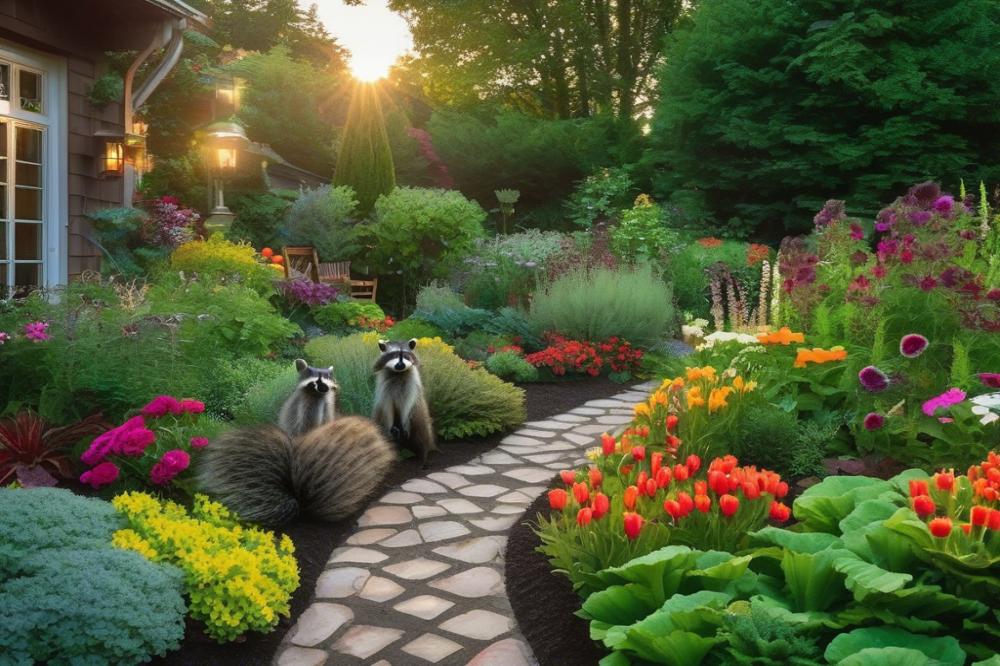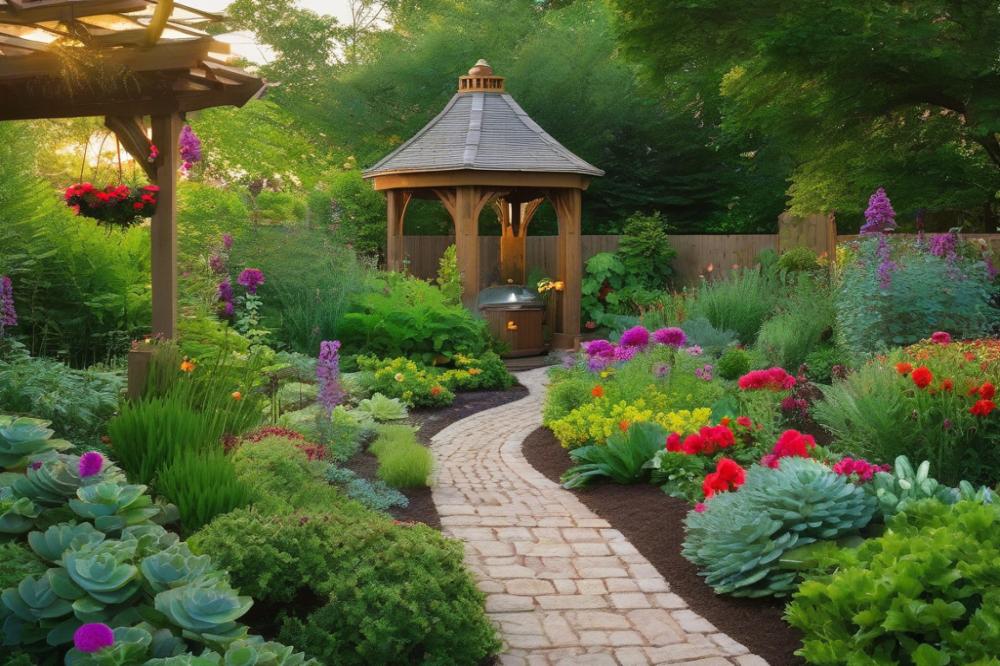How to Stop Raccoons from Raiding Your Garden
Overview of the Raccoon Problem in Gardens
Raccoons are nighttime visitors that can wreak havoc on gardens. These curious creatures often seek out easy meals found in cultivated plants. When exploring your garden, they can cause severe damage to fruits, vegetables, and flowers. Their ability to dig and pull up plants makes them problematic for gardeners. Homeowners may find their hard work and care undone overnight.
Importance of raccoon control
Managing raccoon presence is crucial for successful gardening. When left unchecked, these animals can disrupt an entire ecosystem. They not only eat plants but also leave behind messes that invite other pests. This can lead to further problems, like diseases spreading to crops. Effective garden protection is necessary to maintain the health of your green space. Various pest prevention methods can minimize the chances of raccoons settling in.
Impact of Raccoons on Garden Health and Productivity
The presence of raccoons may decrease your garden’s productivity. Their appetite for ripe fruits and tender seedlings can quickly spoil your harvest. Gardens are meant to be a source of joy, but raccoons can turn that into a struggle. Natural deterrents, like barrier plants or unpleasant scents, often help in keeping them away. Thoughtful garden design can also discourage them from foraging.
Implementing fencing solutions can prevent raccoons from entering at all. High fences are effective, especially if adapted to include a dig-proof barrier. Nighttime strategies might include securing trash bins and removing food sources that attract these animals. Fighting against raccoons is necessary for anyone invested in their garden’s future. Habitats can be modified to be less inviting as well, which deters these furry raiders. In short, using a combination of approaches can lead to significant improvement in garden health and productivity.
Understanding Raccoons and Their Behavior


Raccoons are known for their cleverness and adaptability. These animals are primarily nocturnal, which means they are most active at night. Garden raids often occur during this time when they search for food. They are opportunistic feeders that enjoy a variety of food sources. Fruits, vegetables, and even small insects can attract them to your garden.
Timing plays a crucial role in raccoon activity. Often, they will raid gardens late at night or just before dawn. They seem to have a knack for knowing when people are less likely to be outside. Raccoons search for food to build fat reserves for colder months, so late summer and autumn can be particularly troublesome.
Identifying signs of raccoon activity is vital for effective pest prevention. Look for overturned plant pots or disturbed soil, as these can indicate recent visits. You might also find paw prints around the garden or ripped bags of garbage nearby. Raccoon feces are another clear sign. It usually contains bits of fruit and seeds. Paying attention to these details can help in developing a wildlife deterrent plan.
Making small changes in garden design can discourage raccoons. Fencing solutions can provide a physical barrier to keep them out. A simple fence that is at least four to five feet tall and buried a foot underground can be effective. Natural deterrents, like strong scents, can also make the area less appealing. Using raccoon repellent sprays may discourage their return as well.
It is essential to practice habitat modification. Remove any unwanted debris or potential hiding spots, such as piles of wood or thick brush. Maintaining a tidy garden can reduce places for raccoons to hide. Nighttime strategies, such as motion-activated lights or noise devices, can also scare them away. Employing these tactics will help in keeping your garden safe from unwelcome visitors.
Effective Pest Prevention Strategies


Best Practices for raccoon control
Using strong fencing solutions can be a great start. Build a fence that is at least four feet tall. To add to the protection, bury the bottom of the fence at least a foot underground. This prevents raccoons from digging underneath. A sturdy gate should remain tightly closed at all times. It may be helpful to check for gaps or weak spots regularly. Animals often look for easy ways to invade a yard.
Utilizing wildlife deterrent Techniques
Using raccoon repellent can ward off these pesky intruders. Many products combine natural deterrents like garlic or pepper. Spraying these around the garden may make it an unwelcome area for raccoons. Motion-activated lights can also scare them away during nighttime. An unsuspecting raccoon will likely run from sudden bright lights. You can even try placing sound devices around the garden. Alarm sounds or noise-making tools could keep them on their toes.
Creating Less Attractive Food Sources
Consider adjusting garden design to make it less appealing to wildlife. Picking ripe fruits and vegetables promptly is essential. Leaving food unattended draws raccoons in, making theft easier. Secure trash bins tightly with strong lids. Avoid leaving pet food outside overnight, as this is a tempting treat. Additionally, clean up fallen fruits and debris regularly. By managing these food sources, you reduce their motivation to visit. Habitat modification can significantly improve your chances of success.
Implementing Fencing Solutions


Types of Fences That Deter Raccoons
Several fence types can help keep pesky raccoons out of your garden. Solid wooden fences work well, as they can be tall and sturdy. Chain-link fences also provide a good barrier but may require added measures to enhance their effectiveness. Using electrified fencing is another option, as it can deter even the most determined pests. Consider adding a wildlife deterrent feature to your setup; this could include barbed wire along the top. Such designs make it challenging for raccoons to climb over.
Height and Depth Requirements for Effective Barriers
Effective barriers must be tall enough to prevent jumping. A fence should be at least four to six feet high. Raccoons are agile animals capable of jumping quite nimbly. Furthermore, digging is a common behavior among these critters. To prevent burrowing underneath, bury the fence at least one foot deep. Installing a small trench or adding concrete at the base also helps. Each of these modifications contributes to improved pest prevention.
Tips for Installing and Maintaining Garden Fences
Proper installation is critical for long-lasting results. Begin by ensuring the ground is level and free from debris. Stake out your fence line clearly to avoid misplacement. Consider using durable materials that resist wear over time. Regular inspections help identify any damage or weaknesses that could provide access points for hungry wildlife. A dedicated maintenance routine keeps your barriers effective. Additionally, remember to remove any food sources near the fence to eliminate attractants, as this will further reduce the likelihood of raccoon visits.
Implementing these garden tips can create a more secure space. Combining fencing solutions with good garden design will lead to better outcomes. Keep up the efforts, and make adjustments as needed. A proactive approach can save you constant frustrations related to raccoon control.
Utilizing Natural Deterrents and Raccoon Repellents


Common Natural Raccoon Repellents and Their Effectiveness
Various natural repellents can help keep raccoons away from your garden. For instance, strong scents like citrus peel, garlic, and vinegar are known to deter these critters. Some gardeners have reported success using diluted hot pepper spray. While these methods can be effective, results may vary based on individual gardens and raccoon behavior. Always remember that deterrent methods work best when combined with others for pest prevention.
How to Safely Apply Raccoon Repellent Products
When using raccoon repellent products, follow the instructions carefully. Most sprays should be applied in the morning or early afternoon. This timing helps ensure they remain potent during the night when raccoons are most active. Also, avoid spraying on edible plants to keep your garden safe. Wearing gloves while applying repellent can prevent skin irritation. Make sure children and pets stay away from treated areas until they are dry for added safety.
Integrating Natural Deterrents into Garden Design
Thoughtful garden design can naturally deter raccoons. Consider planting fragrant herbs such as mint and basil throughout your space. These plants produce scents that raccoons dislike. Additionally, habitat modification can play a significant role in keeping them at bay. Secure trash bins and remove any food sources that might attract wildlife. Installing fencing solutions could serve as a physical barrier. Consider using mesh or chicken wire that is buried several inches into the ground to prevent digging. Focusing on nighttime strategies, like lighting up your garden, can also help. Bright lights can startle raccoons and make your garden less appealing for nighttime prowling.
Habitat Modification and Garden Design
Adjusting your garden layout can help limit access for raccoons. Start by positioning your vegetable patch away from trees or fences, as these serve as easy pathways for pests. Keeping flowers and vegetables separate also helps deter unwanted visitors. Consider raised garden beds, which not only improve drainage but also create barriers that make it tricky for raccoons to rummage through your plants.
Plant Choices That Deter Raccoons
Selecting specific plants can work as a natural raccoon repellent. Strong-smelling herbs, like rosemary and lavender, can repel many animals, including raccoons. Cacti and prickly shrubs can act as a physical deterrent. When planting your garden, think about arranging these deterrents around the perimeter. A diverse selection creates layers that can confuse and discourage these animals.
Creating Physical Barriers Within Garden Beds
Fencing solutions are essential for protecting your garden. A robust fence that extends at least one foot underground makes it harder for raccoons to burrow underneath. Opt for fencing that is at least four to five feet high to prevent climbing. Utilizing netting can also provide an extra layer of protection for young plants during the nighttime when raccoons are most active.
Incorporating ground covers such as gravel or thorny plants can help deter raccoons from wandering too close. Strategically placing obstacles like rocks or logs can disrupt their paths. Be mindful of potential food sources, as this will attract raccoons to your garden if left unchecked. Regularly cleaning up fallen fruit or vegetables will reduce the appeal of your garden as a meal stop.
Implementing these garden tips allows for a space that encourages growth while discouraging wildlife. With thoughtful habitat modification, you can enjoy a flourishing garden free from disruptions caused by these raccoon invaders.
Nighttime Strategies for Raccoon Prevention
When evening falls, raccoons become active foraging for food. Implementing best practices is essential for securing gardens during these hours. Garden design can play a key role in preventing these pests from raiding your plants. Consider using sturdy fences as fencing solutions to keep them out. Ensure that these barriers are at least four feet high and buried a foot below the ground to stop any digging efforts.
Lighting can be an effective wildlife deterrent. Placing bright lights around your garden may make raccoons think twice before entering. Motion-activated lights can startle these nocturnal creatures, sending them back into the shadows. Noise also serves as a barrier; sudden loud sounds can disrupt their scavenging. Using wind chimes or amateur alarms, such as those found in many pest prevention systems, can help create a less inviting atmosphere.
In addition to physical barriers, consider utilizing modern technology. Motion sensor devices can provide excellent added protection. These devices often combine lights and sound to alert you of any intruders. When raccoons set off the sensors, they quickly learn that the area is unsafe. Such innovation can be key in keeping unwanted guests from finding food sources in your garden.
Natural deterrents should also not be overlooked. Certain smells, such as citrus or vinegar, can repel raccoons. Spraying these substances around the perimeter can help deter them effectively. Habitat modification is another strategy; removing any clutter can minimize attractive places for raccoons to hide. Regularly clean up fallen fruits, vegetables, or pet food to reduce potential food sources that draw them in.
Adopting these nighttime strategies will help in creating a raccoon-free garden. Each effort contributes towards a successful raccoon control plan. Following these garden tips will keep your plants safe and flourishing throughout the night.
Final Thoughts on Raccoon Control
In summary, several effective methods can help keep raccoons from invading your garden. Utilizing sturdy fencing is a great first step. Properly securing trash cans and compost bins also plays a significant role. You might consider planting raccoon-resistant plants or using a wildlife deterrent to make your garden less inviting. Some people find success with motion-activated lights or noise devices to scare them off.
Taking action is important. Implementing these strategies can help protect your garden. Raccoons can cause substantial damage, so don’t wait until they become a serious problem. Each method contributes to pest prevention and secures your precious plants. Regularly checking your surroundings can help you stay ahead of any unwanted visitors.
Maintaining a raccoon-free garden creates a more enjoyable space for you and your family. Remember, each small step matters. By investing time and effort into deterrent methods, you stand a better chance of enjoying the fruits of your labor. Healthy gardens not only look good but also provide a sense of peace. With the right strategies, a beautiful and thriving garden can be yours.



